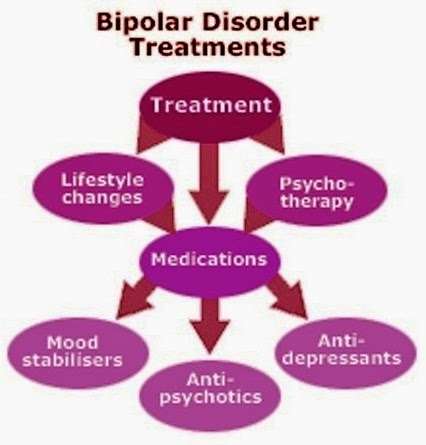Diagnosed with Bipolar – What’s Next?
A bipolar disorder diagnosis may come as a shock and leave you feeling alone, confused, and frustrated. While these are often the initial feelings, it is important to remember that these feelings are normal and it is okay to allow yourself time to adjust to this new knowledge.
What To Know About Your Disorder
Mood disorders affect more than 22 million Americans and are a chemical imbalance in the brain, although the exact cause is still unknown. It is important to know that you did not cause this disorder and there is no way you could have avoided it. It is similar to a physical disorder such as asthma, except it affects your brain and is not easily seen by outsiders. It is not your fault, you are not alone, and your diagnosis is treatable.

Immediately following your diagnosis, give yourself time to absorb the information. It is okay to feel overwhelmed and scared; this is normal. If you have a trusted friend or family member to lean on, utilize their support and let them help you through this. You don’t have to handle your diagnosis alone. If you do not feel comfortable discussing this with friends or family, seek bipolar support groups either in person or online.
Online forums provide a safe, anonymous outlet to express your feelings, ask questions, and seek comfort. Support groups in person also allow you to find this essential support and give you the opportunity to get to know others with the same disorder. People who have been through this diagnosis and living with bipolar disorder for years may be helpful to offer advice and guide you through processing all of this new information.
The single most important thing to do after a bipolar diagnosis is to educate yourself. This will come in a variety of ways. Your first point of contact for education should be a healthcare provider. This may be your primary care physician, therapist, psychologist, or counselor. If you are not comfortable with any of these resources, seek a second opinion and find a provider that you feel you can be completely comfortable with.
You should have a healthy, trusting relationship with your provider. Ask your provider as many questions as you can think of, especially questions regarding your options and resources that are available to you. You may also be interested to know if there are any other possible diagnoses. Ask about your bipolar medications and their side effects, treatment costs and options, and which psychological therapies would be most beneficial for you.
Understanding How Medication Treats Bipolar
Your provider may recommend medication to treat your disorder. Taking prescription bipolar medication is a personal choice, but many have found it to be the most beneficial at stabilizing moods and avoiding episodes. Every person’s brain is different and reacts differently to these medications.
Therefore, your provider may need to try different combinations and dosages. This can be frustrating and time-consuming, but it is important to remain patient. Most medications take two to six weeks to take effect, so you may need to revisit your provider every three to seven weeks to determine if they need to be readjusted.
There are hundreds of different combinations, which may sound discouraging, but your provider should be able to narrow down which of these will be best for you. Do not give up if the first few tests do not work for you; give yourself time and give your provider a chance to find the correct combination.
Keep in mind that some anti-depressant medications will have side-effects. Do not let this deter you as there are many ways to minimize or avoid these side-effects. Many providers recommend taking medications with food or at night. They may also prescribe more medications to combat the side-effects, such as anti-nausea medication. However, if you experience severe side-effects, immediately contact your doctor. Don’t put yourself at risk for further complications.

Your provider may also recommend seeking mental health counseling either in addition to or instead of your medications. He or she may provide you with a referral, but you may also research providers on your own. A psychiatrist, psychologist, or therapist is beneficial to help those with bipolar disorder explore, understand, and further treat their disorder.
Psychotherapy, otherwise known as talk therapy, has been found to be very beneficial in treating those with bipolar disorder. Psychotherapy will help you understand yourself and your disorder better, helping you become more aware of your behaviors. Once you are aware of your behaviors, your therapist will teach you how to acknowledge your triggers, develop coping skills, and learn how to handle situations that would otherwise lead to negative episodes.
Just like medication, therapy takes time and patience, but it also takes a good connection with your therapist. You should feel comfortable and confident in your therapist’s abilities to help you. If you do not feel that you and your therapist make a good team, consider finding another one. Remember that the therapist may challenge you to view your behaviors differently than you’ve ever considered them before, so keep an open mind and give it your full effort. Many people suffering from bipolar disorder have found great success in preventing episodes and coping with situations using psychotherapy.
Knowing What to Expect
Those with bipolar disorder often go through periods of clinical depression or have suicidal feelings. Now that you understand where these feelings are coming from, you can better cope with them and avoid harming yourself. The best way to approach suicidal feelings is to become proactive and create a plan before you start feeling this way. Write out a specific plan of action that you can follow if or when you start having these low feelings. Within your plan, include a list of trusted friends and family or healthcare providers that you can call for help.

You should not handle these feelings alone. If you include friends and family on your list, ensure that they have an action plan as well and know how to help you cope with your feelings in a positive way. You can also include a crisis hotline phone number; those who answer the phone will be specifically trained to help you cope with negative, distressful feelings. Also, include coping strategies that you’ve learned from your therapist within your action plan.
Seeing these strategies in front of you will remind you of them when your mind is elsewhere. Finally, remind yourself that these are temporary feelings and are not your true thoughts. They are a symptom of your disorder, and you should treat them as such. Symptoms are not a part of you; they are a part of the disorder and can be treated.
Bipolar disorder can be frustrating and a scary diagnosis at first, but recognition is the first step in the right direction. Now that you know what your disorder is, you can take steps towards treating it, coping with it, and getting your life back. Allow yourself time to adjust, keep an open mind about your options for mental health treatment, and remember that you are not alone. Your bipolar disorder can be treated, and you can gain control over your symptoms.

